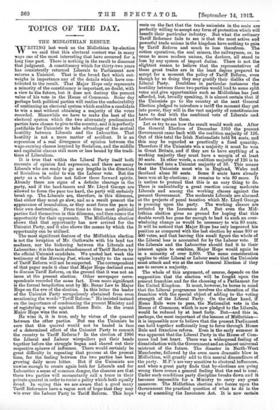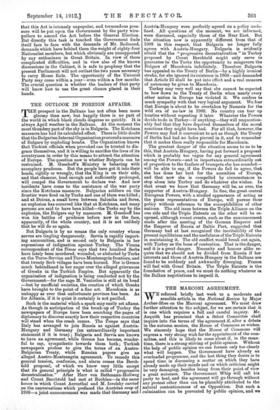TOPICS OF THE DAY.
THE MIDLOTHIAN RESULT.
WRITING last week on the Midlothian by-election we said that this electoral contest was in many ways one of the most interesting that have occurred for a long time past. There is nothing in the result to discount that judgment. A constituency which for thirty-two years has consistently returned Liberals to Parliament now returns a Unionist. That is the broad fact which out- weighs in importance any of the details which have con- tributed to the result. That Major Hope only represents a minority of the constituency is important, no doubt, with a view to the future, but it does not destroy the present value of his vote in the House of Commons. Some day perhaps both political parties will realize the undesirability of continuing an electoral system which enables a candidate to win a seat without obtaining a majority of the votes recorded. Meanwhile we have to make the best of the electoral system which the two alternately predominant parties have chosen to give to the country, and it is perfectly justifiable for Unionists to take advantage of the mutual hostility between Liberals and the Labourites. That hostility is not a mere matter of accident. It is an expression of a real divergence of opinion between the wage-earning classes inspired by Socialism, and the middle and capitalist classes still more or less bound by the tradi- tions of Liberalism.
It is true that within the Liberal Party itself both currents of opinion find expression, and there are many Liberals who are ready to go any lengths in the direction of Socialism in order to win the Labour vote. But the party as a whole dare not follow these forward spirits. Already there are signs of a definite cleavage in the party, and if the land-taxers and Mr. Lloyd George are allowed to force the pace too hard, the party will certainly break up. The Liberals are, therefore, in this dilemma, that either they must go slow, and as a. result present the appearance of irresolution, or they must force the pace to their own destruction. From time to time most political parties find themselves in this dilemma, and then comes the opportunity for their opponents. The Midlothian election shows that that opportunity has now arrived for the Unionist Party, and it also shows the means by which the opportunity can be utilized.
The most significant feature of the Midlothian election is not the irruption of Mr. Outhwaite with his land tax madness, nor the bickering between the Liberals and Labourites; it is the tacit abandonment of Tariff Reform by the official Unionist candidate. We quoted last week the testimony of the Morning Post, whose loyalty to the cause of Tariff Reform will not be suspected. The correspondent of that paper made it clear that Major Hope declined even to discuss Tariff Reform, on the ground that it was not an issue at the present election. Other newspaper corre- spondents recorded the same fact. Even more significant is the formal benediction sent by Mr. Bonar Law to Major Hope on the eve of the election. In this letter the leader of the Unionist Party scrupulously abstained from even mentioning the words " Tariff Reform." He insisted instead on the importance of condemning the present Ministry and of registering a vote against Home Rule. In the event Major Hope wins the seat. He wins it, it is true, only by virtue of the quarrel between the other parties. But can the Unionists be sure that this quarrel would not be healed in face of a determined effort of the Unionist Party to commit the country to Tariff Reform ? In the election of 1906 the Liberal and Labour wirepullers put their heads together before the struggle began and shared out their respective spheres of influence. There would certainly be great difficulty in repeating that process at the present time, for the feeling between the two parties has been growing daily more bitter. But if the Unionists are unwise enough to create again both for Liberals and for Labourites a sense of common danger, the chances are that these two parties will momentarily call a truce in their private quarrel in order to resist a policy which both equally dread. In saying this we are aware that a good many Tariff Reformers have a vague sort of hope that they may win over the Labour Party to Tariff Reform. This hope rests on the fact that the trade unionists in the main are perfectly willing to accept any form of protection which will benefit their particular industry. But what the ordinary Tariff Reformer fails to see is that the most active and powerful trade unions in the kingdom bare nothing to gain by Tariff Reform and much to lose therefrom. The cotton operatives, the coal miners, the railwaymen, or, to come to more modern unions, the dockers, all stand to lose by any system of import duties. There is not the slightest reason to believe that the representatives of these great trades are in the least degree prepared to accept for a moment the policy of Tariff Reform, even though by so doing they may gratify their dislike of the Liberal Party. Doubtless in particular instances the hostility between these two parties would lead to some split votes and give opportunities such as Midlothian has just afforded, but, broadly speaking, it is almost certain that if the Unionists go to the country at the next General Election pledged to introduce a tariff the moment they get into power, they will in the vast majority of constituencies have to deal with the combined vote of Liberals and Labourites against them.
Let us try to see how the result would work out. After the General Election of December 1910 the present Government came back with the coalition majority of 126. Out of this total the Irish Nationalists held 84 seats, and this may be regarded as practically a fixed quantity. Therefore if the Unionists win a majority it must be won in Great Britain, and if they are to have anything of a. working majority they must have a margin of at least 50 seats. In other words, a coalition majority of 126 is to be converted into a Unionist majority of 50. This means that the Unionists must win in England, Wales and Scotland alone 88 seats. Some 8 seats have already been won at by-elections ; it remains to win 80 more. It is useless to pretend that this is an easy thing to do. There is undoubtedly a great reaction among moderate Liberals and among the working classes against the present Government. The moderate Liberals are alarmed. at the projects of penal taxation which Mr. Lloyd George is pressing upon the party. The working classes are irritated by the Insurance Act. But even the Mid- lothian election gives no ground for hoping that this double revolt has gone far enough to lead to such an over- whelming change as would be necessary to win 80 seats. It will be noticed that Major Hope has only improved his position as compared with the last election by some 300 or 400 votes, and that barring this small figure the whole of the Liberal loss is accounted for by the Labour vote. If the Liberals and the Labourites should find it to their interest again to combine, Major Hope would again be in a minority of over 2,000. The same consideration applies to other Liberal or Labour seats that the Unionists must attack and win at the next General Election if they are to secure a majority.
The whole of this argument, of course, depends on the supposition that the election will be fought upon the present franchise and for the choosing of a Parliament for the United Kingdom. It must, however, be borne in mind that the Liberal programme involves the alteration of the franchise with the special object of adding to the voting strength of the Liberal Party. On the other hand, if Home Rule were to pass, the Nationalist vote in the House of Commons, which is now pledged to the Liberals, would be reduced by at least forty. But—and this is, perhaps, the most important of the lessons of Midlothian— it is impossible now to believe that the present Parliament can hold together sufficiently long to force through Home Rule and franchise reform. Even in the early summer it was apparent that the Liberal Party in the House of Com- mons had lost heart. There was a widespread feeling of dissatisfaction with the Government and an almost universal mistrust of the future. The disaster in North-West Manchester, followed by the even more dramatic blow in Midlothian, will greatly add to this mental discomfiture of the party. M.P.'s are very sensitive to electoral influences, and when a great party finds that by-elections are going wrong there comes a general feeling that the end is near. Under such conditions party discipline breaks down and it becomes impossible for a Ministry to carry any great measures. The Midlothian election also forces upon the Government the practical question of what to do in the way of amending the Insurance Act. It is now certain that this Act is intensely unpopular, and tremendous pres- sure will be put upon the Government by the party wire- pullers to amend the Act before the General Election. But directly this task is touched the Government finds itself face to face with the demands of Mr. Redmond, demands which have behind them the weight of eighty-four Nationalist members, but which obviously are unsupported by any enthusiasm in Great Britain. In view of these complicated difficulties, and in view also of the known dissensions in the Cabinet, it is safe to prophesy that the present Parliament will not outlast the two years necessary to carry Home Rule. The opportunity of the Unionist Party may come within a year—even within a few months. The crucial question is whether the leaders of that party will know how to use the great chance placed in their bands.







































 Previous page
Previous page